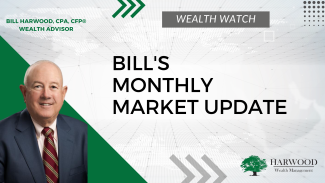
Wealth Watch - Bill's Monthly Market Commentary
We now know what excess spending by the federal government does to the economy.
Investors have finally awakened to the size of the national debt and the speed with which it’s growing. Total debt is approaching $34 trillion, up from $22 trillion as recently as 2019. Given the rise in interest rates, the nation’s interest expense is also snowballing—to an annualized $981 billion in this year’s third quarter from $509 billion in the same quarter in 2020. Think about that, soon our government will be spending One Trillion dollars a year on interest alone. So many other programs could benefit from our government’s largess, but it will go towards interest on our massive deficit.
The Federal Reserve will have completed their November meeting by the time you read this. I suspect that they will not raise interest rates at this meeting; however, there still may be one or two increases in the coming months before they believe they have inflation back under control. Increases in the Fed Funds rate make the prices of existing bonds go down so that their yields go up to attract buyers. The bond rout has been brutal. Supposedly ultrasafe Treasuries are on track to lose money for three consecutive years, declining 42% over that period. Other bonds, whether mortgage-backed securities or high-quality corporates have also taken a beating, leaving investors with losses from what are supposed to provide ballast in a portfolio.
For the last three months ending October 27, 2023, the S&P 500 is down 10.14%. Every sector of the market is down, as well as the value of most bonds. Money market accounts have been one of the few safe havens. There has been good news reported. Third quarter GDP came in at 4.9%; however, the sentiment is that this will cause the Federal Reserve to keep interest rates higher for longer in order to cool the economy and inflation. Then there were the 3rd quarter earnings reports from companies like Microsoft, Google, Meta and Amazon, all beating their estimates for revenues and profits; the market yawned and then went down. Investors seem to be focused on issues such as the Middle East war with Israel, illegal immigrants crossing our southern border, disfunction in Washington, DC, and especially the rising interest rates.
When will the markets improve? Traditionally the 4th quarter has been the best quarter in the market. There is also the effect of stock prices getting so cheap that they become too attractive not to buy. Christmas and holiday spending is on the verge of kicking in. The markets may get worse before they find their footing and start growing again. Who are the winners in this type of market; individuals who continue to save each month in their retirement plans or investment accounts. Dollar Cost Averaging gives you the ability to buy more shares, for the same dollars, while the prices are falling. Once the market turns around these additional shares turn into real gains.

